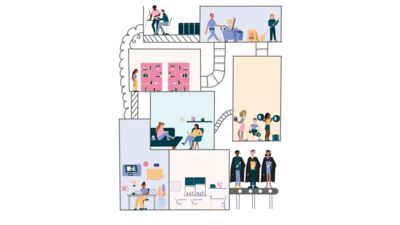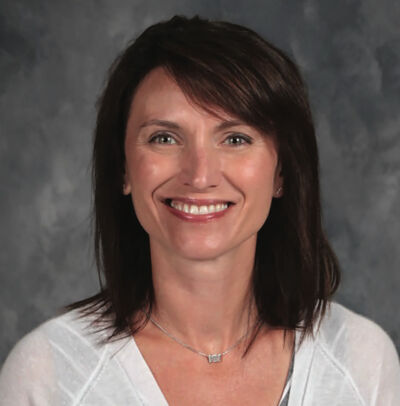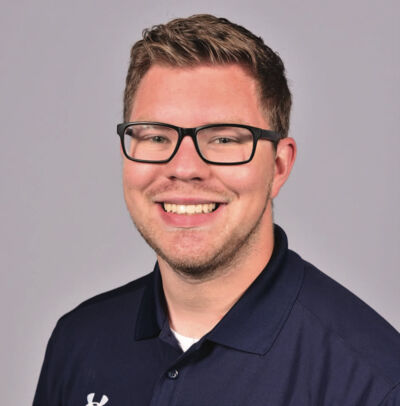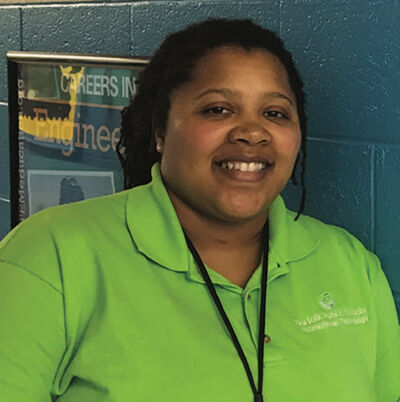
Eyes on a Higher Purpose
Story: Danielle Lubbe
Illustration: Elizabeth Kucera
Photos: Courtesy of Alecia (Teichmeier) Boyd ’98, Lisa (O’Brien) Holloway ’97, Angela Lewis ’02, Sam Moore ’20 and Chris Reno ’98
While many of us have seen the workings of a school from the outside as students and parents, few of us get to see all the work that happens behind the scenes.
The first day of a new school year is always an exciting time for educators, students and parents. Backpacks are bought, front step photos taken, classrooms decorated. There’s an air of promise, of expectation, of eagerness; the start of anything new means that potentially anything can happen.
To make a school year run smoothly, there is frenzied work that happens behind the scenes that most people never see. From administrators to teachers to support staff to coaches, there are parts of every role in education that require dedication and service above and beyond the listed job description.
“I have a saying, that each day is a new adventure in preschool,” says Lisa (O’Brien) Holloway ’97, the preschool director and assistant principal at Christ Lutheran Church and School in Phoenix, Arizona.

Holloway oversees the preschool program at Christ Lutheran, which typically includes managing the staff, classroom support and parent communications. As the assistant principal, she also observes teachers and classrooms, oversees the afterschool programs and supports the principal.
“Besides the typical day-to-day routines, I often have something come up that was not on the schedule for the day,” she says. “I have had to plunge toilets, clean up undesirable messes (you can only imagine what I have had to clean up), try and locate a ‘mystery smell,’ find creative ways to get a three-year-old off the playground equipment who refuses to come in and the list of adventures goes on. Now, with all of the messy stuff, also comes some pretty great stuff; the times when I get to be the one who comforts an upset child, getting to be the mystery reader for a class, the random hugs and the times when I get to just play with children. I love all of the adventures that come with my job!”
Sam Moore ’20 just finished an adventure of his own: his first year of teaching sixth grade homeroom, sixth grade religion and sixth through eighth grade math at St. Paul’s Lutheran School in Concordia, Missouri.
“I think a lot of times people think that teachers just work 8 a.m. to 4 p.m., they get weekends off and summers off and that is just not the case,” Moore says. “Most teachers are working constantly, from making new lessons that are tailored to their current group of students to grading papers to worrying about their at-risk students. We continue this process through the weekends and the summers.”

Another education job that is often surrounded by misconceptions is that of school counselor. Alecia (Teichmeier) Boyd ’98 is a school counselor at Kearney High School in Kearney, Nebraska. “I think the perception of school counselors is that we help guide students to develop a post-secondary plan and that we help students with their schedules. While that is true, it is only part of what we do,” she says. “A good portion of my day is spent providing personal-social counseling for students: helping students develop coping strategies, communication skills, conflict resolution and personal goals.”
Since counselors spend so much of their time with students, they are often the first to notice when students and families are in crisis or have mental health needs that have to be addressed. Working with students in these circumstances can be difficult and there isn’t always a fast or easy resolution. Sometimes an administrator needs to get involved and help mediate conversations between teachers, parents and students.
The job of an assistant principal also typically involves working with the principal to oversee teaching staff and enforcing a school’s policies and procedures. However, for Chris Reno ’98, it goes deeper.
Fixing my eyes on the higher purpose in the work that I do with students and families is my strength in the difficult days.
At Long Island Lutheran Middle and High School in Brookville, New York, Reno has started to use small group discussions with student groups to facilitate restorative justice principles. And he’s been connecting more closely with students and their families. “I speak to our students’ families on a weekly, if not daily basis,” Reno says. “I have really learned to take the time to listen to people and allow them to vent or get things off their chest. At the end of it all, we are all made equally in the image of God and people need to be treated in accordance to that wonderfully-made image.”

The COVID-19 pandemic was a part of the catalyst for forging those deeper connections. “In March 2020, we officially went remote for the remaining part of the school year,” says Reno. “It was during this time that our school made a deliberate attempt to speak to parents and touch base with our families to make sure they were doing OK.”
COVID-19 has changed many things for educators over the past year and a half. Angela Lewis ’02 is an Instructional Technology Resource Teacher for Norfolk Public Schools in Norfolk, Virginia. In her role, Lewis teaches teachers how to use and integrate technology into their lessons. Over the past year, it’s safe to say technology has become a vital piece of any industry, but especially education as school districts, teachers, students and administrators have adapted to the ever-changing pandemic.
Before, many schools and students within Lewis’s school district did not have technology incorporated into their daily lesson plans because resources were limited, Lewis says, but now each student has a computer available to them.
“I have also taken on many roles outside of integrating technology in classroom lessons such as tech support, helpdesk support, coach and at times unofficial therapist/spiritual advisor to those who were frustrated, ready to give up and had lost their way,” she says.
Lewis says she’s honored and humbled to serve however she’s able. “It takes a village to raise a child and I feel grateful to be a part of that village, serving teachers so they may better educate and engage our students using technology,” she says.
All of these education professionals lean on their faith to help guide them through the school year.
“Anytime that things start to get a little rocky or I find out one of my students is going through a hard time, I know that I can go to God,” says Moore. “It is such a blessing to teach in a Lutheran school where we can start our day as a staff in devotions, where I can start my morning with devotions with my sixth graders and where I can have my students start each class in prayer.”
“Our world is a fallen, struggling, place and a lot of people are suffering and seeking relief,” Reno says. “I try to approach every day with an understanding I do not know all the crosses people have to bear. But I do know I am called to Love the Lord God with all my heart, soul and mind, and to love my neighbor as myself.”
These Concordia alumni also know that they can call on their education and the Concordia network if they need a little extra push.
“When I run into things that I'm not so sure about, I can go to the vast network of people that I have been able to meet throughout my years at Concordia, from my fellow classmates, professors and even teachers I worked with in the field,” says Moore.
“My professors at Concordia encouraged me and modeled Christ-like service,” agrees Boyd. “They exhibited a passion for their content and helped me to see my career as a calling and not just a job. Fixing my eyes on the higher purpose in the work that I do with students and families is my strength in the difficult days.”

